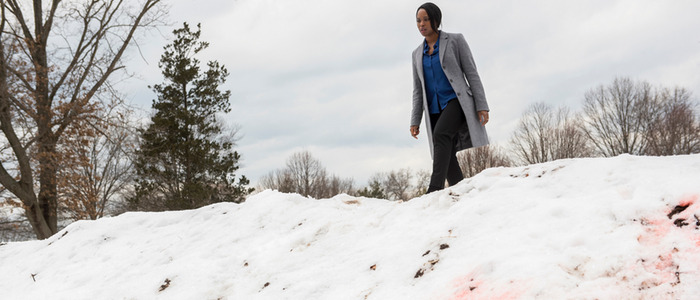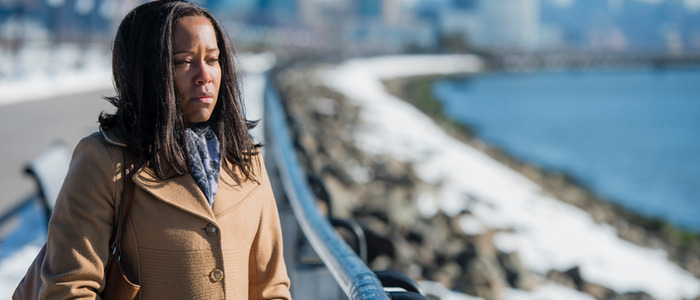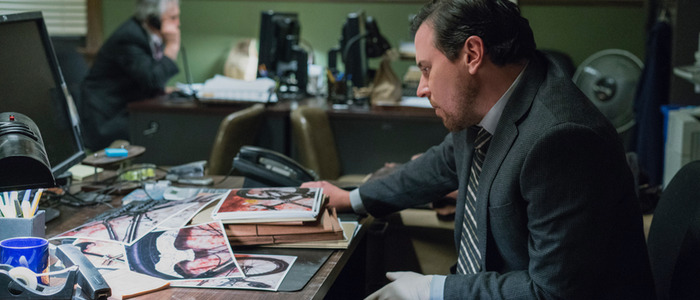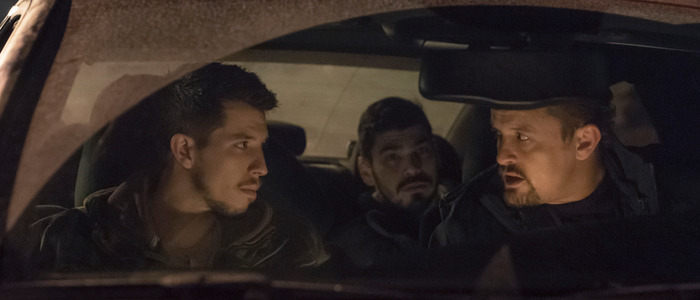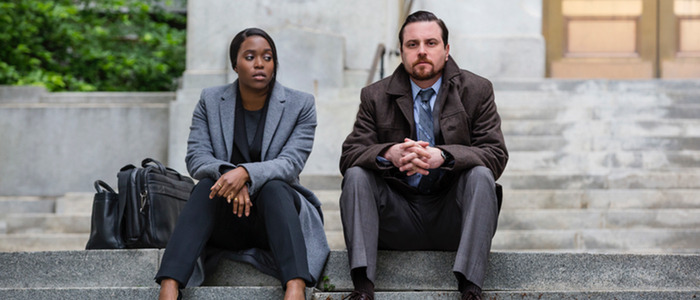'Seven Seconds' Review: Netflix's Latest Is An Addictive Procedural
Netflix's new series Seven Seconds is an addictive procedural drama that starts off as a murder mystery and turns into something else. The show isn't so much concerned with the crime at hand as it is the fallout – the trauma that befalls relatives, and the way such events can impact several different lives. Seven Seconds has big issues on its mind, particularly tensions that arise in a community when dealing with a racist police force. Ultimately, it's not entirely successful with its bigger issues, but a series of stellar performances elevate Seven Seconds into something worth watching.
Our Seven Seconds review continues below. Some minor spoilers follow.
The Story
Seven Seconds hails from Veena Sud, who developed the American version of The Killing. Like that former AMC series, Seven Seconds is a gritty, often disheartening crime drama that has more on its mind than just a central mystery.This is a show that's very much embroiled in current events. Seven Seconds uses its central crime – the hit and run death of a black child named Brenton Butler in Jersey City – to delve into a drama that deals with issues of race. Namely, the hot-button matter of race relations between an unabashedly racist police force and the black community they push up against.The person who runs down Brenton happens to be a (white) cop, speeding towards the hospital after he gets an emergency call about his pregnant wife. The accident is clearly that – an accident. But when the distraught cop's fellow officers arrive on the scene, they're quick to cover the crime up. The way they see it, the minute the public hears about a white cop running over a black kid, it'll blow up into just another story about a racist police force. In attempting to cover up this situation, they inadvertently create it. It's not long before their terrible action blows up in the media, and the community. And it's not long before someone is able to connect the dots and discover it was cops who did the foul deed.That's the main set-up of Seven Seconds, but the show branches off from there and ventures down more avenues. There's an assistant prosecutor with a drinking problem; a detective with marital issues; a drug addicted witness to the crime with her own baggage. Then there are the tormented parents of the boy so coldly run down and left for dead, struggling to come to terms with their sudden loss while being simultaneously rejected by the system that should be helping them. This is all big, heavy stuff, and Seven Seconds makes all of it work, though it occasionally takes shortcuts that require more than a standard suspension of disbelief.
The Characters
Clare-Hope Ashitey takes the lead as KJ Harper, an assistant prosecutor who gets put in charge of the case involving the hit and run. Before she gets involved with the show's central mystery, we see KJ heavily inebriated, taking part in a bit of drunk karaoke at a local bar. It soon becomes apparent that this isn't a one-time thing; KJ has a drinking problem, and her career is in a bit of a tailspin. She shows up to court unprepared, and she's still reeling from an affair with her boss. Ashitey, who also appeared in Children of Men, is stellar in the role. KJ may fall into the standard "flawed protagonist" category that so many modern shows seem to embrace, but Ashitey's performance is layered and compelling. The way she handles KJ's constant waffling – she's determined to make a difference one minute, then terrified to confront a grieving family the next – is impressive to behold. The only thing that trips the character up is an underdeveloped backstory involving family history.The co-lead of the series, or at least the character who has the second biggest part to play after Ashitey, is Regina King as Latrice Butler, mother of hit-and-run victim Brenton Butler. King has the big, emotional moments of the series, and she never fails to deliver. This is the type of powerful, raw performance that gets awards season attention, and rightfully so. Latrice and her husband are deeply religious, but after their son is taken from them, Latrice's faith falters, and she spirals downward to a point where she's sleeping in her car and contemplating buying a gun to get revenge. Not all of the character motivations are entirely believable on paper, but King's fierce performance manages to make them all work.A surprise stand-out of the series is Michael Mosley, who turns in a funny, quirky performance as Joe "Fish" Rinaldi, a homicide detective who teams up with KJ to look into the Butler case. Like Will Graham on Hannibal, Fish has a house full of stray dogs he's taken in, and the show gets great mileage from quick sight-gags, like Fish reading a dog-centric magazine while waiting to meet another character. While Fish is ultimately on the side of good, and more often than not does the right thing, he's still not above slipping into the type of prejudices that plague the police department. His first assumption when he starts looking into the Brenton Butler case is that Brenton is a banger who likely stole the expensive bike he was riding when he was run down. The chemistry between Mosley and Ashitey, which starts off adversarial but settles into a mutual respect, is a big draw.Russell Hornsby is a powerhouse as Isaiah Butler, husband to Latrice and father to Brenton. It's clear Latrice and Isaiah's marriage is slightly distant before Brenton's death, but afterwards, the rift between the couple widens drastically. While King's storyline as Latrice goes off in its own potentially dangerous direction, Hornsby's Isaiah struggles with his own inner turmoil. He keeps most of his rage and sadness inside, until it erupts in fury. Along the way, he begins to learn things about his son he never know, which complicate things further. Hornsby has a commanding presence, and the show could actually use more of him.Beau Knapp plays Officer Pete Jablonski, the cop who runs over Brenton on quiet, snowy morning. Jablonski is the newest member of an elite anti-gang and drug unit, and after the accident, his team are the people he calls. The team are quick to help him cover things up, but at first, Jablonski seems determined to do the right thing. He wants to turn himself in – it was an accident, after all. Even after the cover-up first goes into place, Jablonski considers ending things. But the deeper into the hole he gets, the more violent and anxious he becomes. Jablonski is the most fleshed-out of all the characters, and Knapp plays him with a jittery, unnerving intensity.The rest of the police squad who purportrate the cover-up consists of actors David Lyons, Raul Castillo and Patrick Murney. Of these three, Lyons, as the team leader, stands out the most, as he seems to be the most duplicitous. While all three of the actors do well in their roles, their characters are the least engaging of the series. Part of this revolves around the fact that the series puts them in more and more outlandish scenarios, to the point where they start to resemble villains from a comic book rather than a team of corrupt cops. One action carried out by the team near the show's conclusion feels particularly ludicrous, and saps the show of some power.The rest of the cast is rounded out by Michelle Veintimilla, playing Jablonski's Lady Macbeth-like wife, who is more than happy to help him purportrate a cover-up as long as it keeps her new family safe; Corey Champagne as a friend of Brendan Butler, who knows more than he's letting on; and Nadia Alexander, as a teenage junkie who happens to witness the accident and develops a sometimes friendly, sometimes adversarial relationship with Fish as the cop tries to get her to testify against Jablonski and company. All three performers are quite good, with Champagne in particular having a lengthy, dramatic monologue in which he nearly steals the show.
Is It Too Long, Like Every Netflix Show?
Yes.While Seven Seconds doesn't make the mistake of Marvel shows and run for a torturous 13 episodes, it does overstay its welcome at 10. This becomes apparent in the last four episodes in particular. The first chunk of the series moves at a quick, breakneck pace, burning through characters and storylines with urgency and excitement, making the series inherently bingeable. Then, the show all but grinds to a halt, and staggers across its finish-line. It's as if the writers were on a roll, then realized they had to stretch the story across 10 episodes and started to deliberately pace themselves. The show suffers as a result. Had Seven Seconds been whittled down to 8 episodes instead of 10, it would be a much better series.
What Doesn’t Work
The aforementioned episode count of the show really does bog it down. Without getting into too many spoilers, Seven Seconds all but wraps-up its storyline by episode 7. The minute I realized this, and then realized there were still three more episodes to go, my heart sank. I all-but-knew this was a sign that show was going to torch the goodwill it had built up to drag the story out even longer. Sure enough, I was correct. To be clear: the decisions the show makes in its final three episodes make sense, but they don't quite work with everything that's come before.Another problem Seven Seconds has involves shortcuts. While it's understandable that a TV series wouldn't want to delve into the frequently-boring minuta of police work, more often than not, the show will have characters jumping to dead-on conclusions. The result seems often forced and unbelievable. On that same note, Seven Seconds has a real problem involving characters who neglect to mention things to each other.There's precedence for this. After all, if characters in Jane Austen novels would just confess their feelings and motivations to each other, the books would be only one page long. Still, there's a way to make this work, and Seven Seconds doesn't quite nail it down. As a result, there's a nagging sense that if certain characters would just open their mouths and tell other characters things, Seven Seconds would be a lot cleaner, and a lot more engaging.
What Works
As mentioned above, the show really does move quite well. It's addictive television, and it's addictive in a way that doesn't feel manipulative. Some shows will end nearly every episode with a cliffhanger to suck you back in; Seven Seconds avoids this, but still manages to hook the viewer to the point where you feel you must keep watching to see where the show is going to go.The late, great Jonathan Demme directed one of the episodes, and, needless to say, his episode is the best. It's a haunting, quiet episode filled with reflective moments. It comes very early in the series, and one almost wishes the show had stuck with this method of storytelling a little longer before jumping into its mystery. Still, this is one of the very last things Demme directed, and it's a treat to watch his work.Beyond that, the real draw of Seven Seconds is the cast, particularly Clare-Hope Ashitey and Regina King, playing two very different women searching for the same thing. Both actresses take the show into interesting directions, and both are excellent at handling their overall arcs and emotional moments. Seven Seconds ultimately isn't your normal type of murder mystery show. It's more about the fallout; the way people deal with picking up the pieces following the traumatic event.
***
Seven Seconds arrives on Netflix February 23, 2018.

